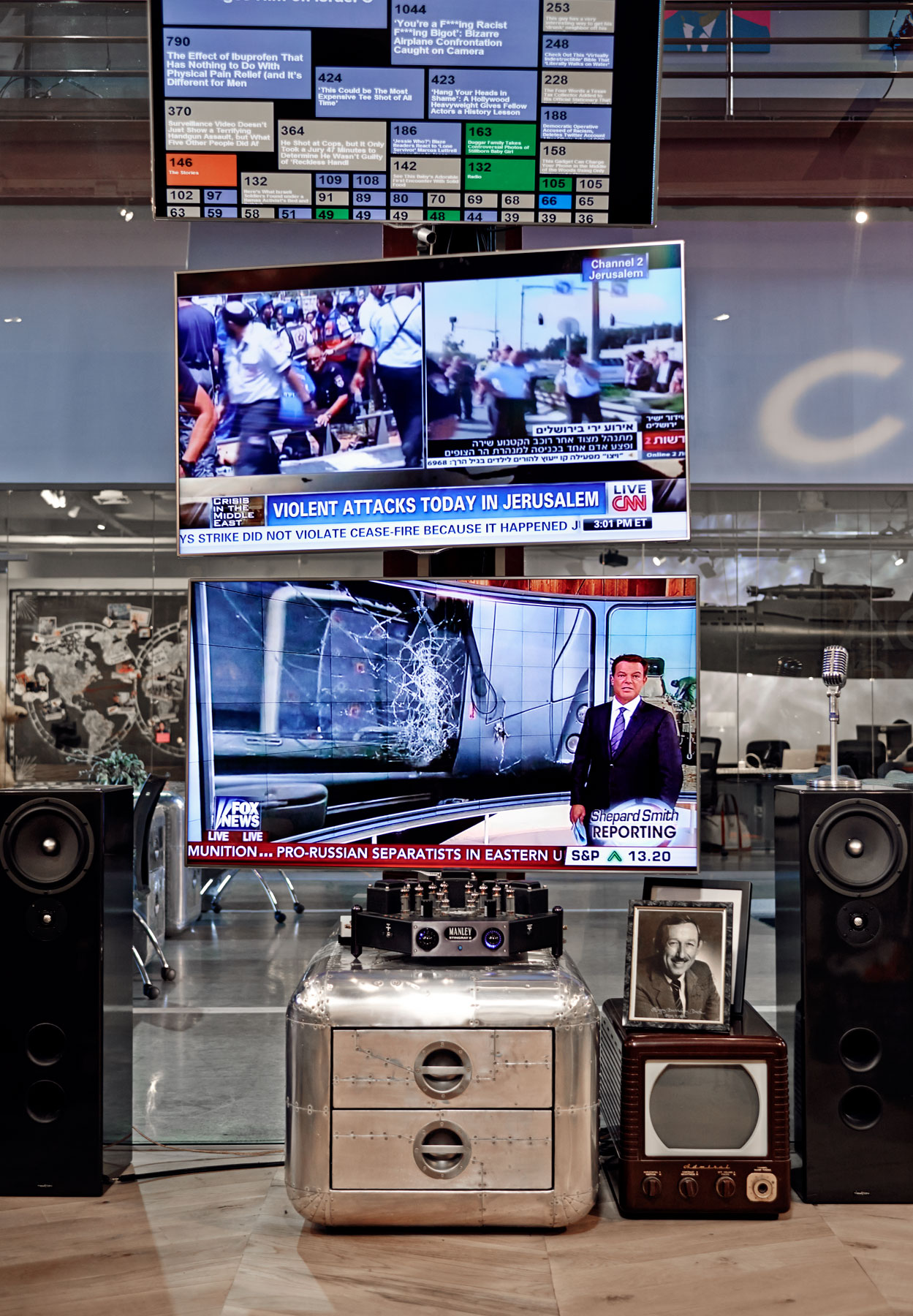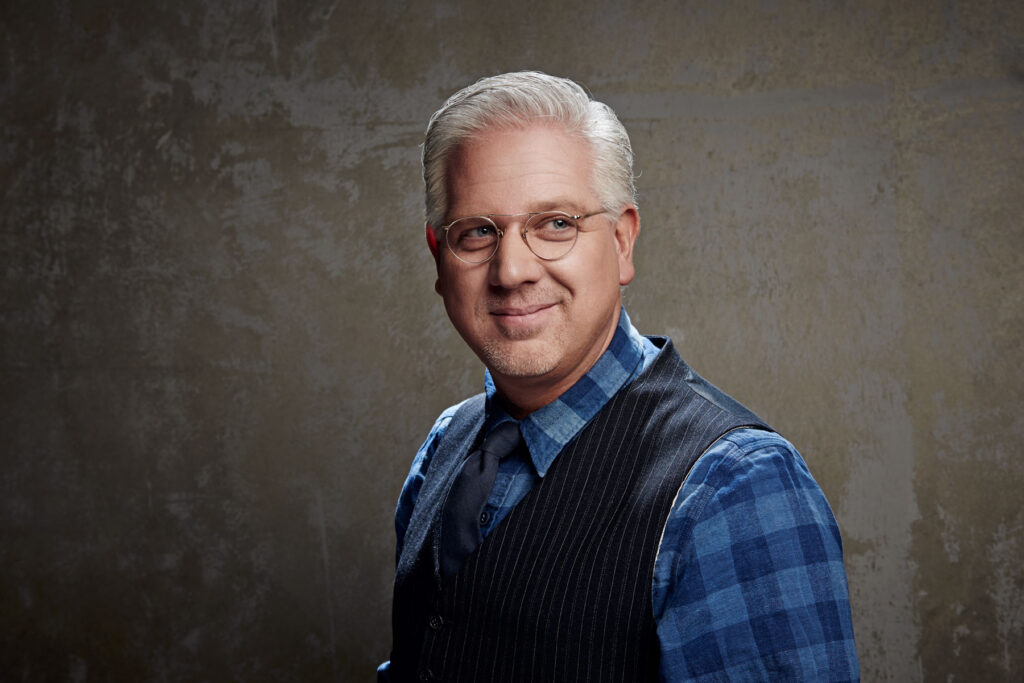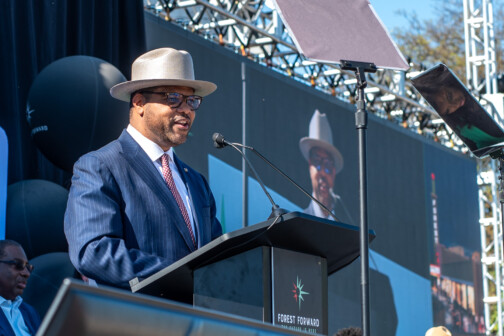
Beck is hard to parse. Sometimes he’s self-deprecating, telling me that, being new to Texas, he’s “still all hat and no cattle.” Sometimes he’s the exact opposite, telling me that his company is “just scratching the surface” of what it can do in terms of storytelling and entertainment, and that it might put “old media” out of business within a few years. And sometimes it seems Beck is in a permanent existential crisis, wondering how he got to where he is in life.
The money, the attention, the ability to gather a giant crowd on the steps of the Lincoln Memorial: “My talent didn’t get me there, obviously,” he says. “There’s no way you could get from where I was in 2000—broke, never done talk radio before, never done television before, nothing—to 10 years later, 500,000 people. How is that happening?” To him, it feels destined. Fated. Like he’s a character from the Bible.
He’s probably most known for his tear-stained soliloquies. Those do still happen, but they are rarer. A lot of his shows are filled with personal anecdotes from his family or stories he’s heard or read about, mixed with his personal takes on whatever topic comes up. He was quick to criticize Cliven Bundy, the renegade Nevada rancher, even before Bundy’s remarks became more overtly racist. Beck also has a running clock counting how long Sgt. Andrew Tahmooressi, the former Marine arrested while crossing the border with three loaded guns, has been imprisoned in Mexico, and he isn’t above calling out individual bureaucrats he thinks should be fired. But he’s also interested in engaging with people who view the world differently. He had Malcolm Gladwell on and asked him about not only his book David and Goliath, but also about his spirituality. Not long ago, singer-songwriter Andrew W.K., the self-described “philosopher of partying,” appeared on Beck’s show to talk about his new weekly column in the Village Voice. Beck showed the singer an out-of-tune blue piano played by protesters in the Ukrainian revolution and asked him to play a song that “speaks freedom or liberty.”
His website is like the Huffington Post with a libertarian bent. There’s a lot of aggregation and news of the day, along with the television stream, which is also available on Dish and through iTunes. When Beck isn’t on the air, there’s other content, about 200 hours a month. His sidekicks, Pat Gray and Steve “Stu” Burguiere, have their own shows. There are documentaries and children’s programming. There’s a low-budget, conservative-minded version of Saturday Night Live that airs on the weekends.
Nearly all of that comes out of this building. There are three soundstages, and behind them it looks like a magician’s workshop. There are big safes and strange-colored couches and what looks like the remnants from the set of a western.
Beck has meticulously placed a lot of the items around the studio. He has a taxidermied polar bear in a corner and wooden octopuses hanging from the ceiling. He has a lot of old-fashioned cameras and movie reels and the kind of radio microphones used to record soap operas more than half a century ago. He has a 10-foot-tall portrait of Abraham Lincoln made from 150,000 roofing nails and two gigantic audio-animatronic robots he plans to take with him on a tour of the nation someday. He’s waiting to take delivery of a statue of Vladimir Lenin, a gift from real estate mogul Harlan Crow.
Fifteen years ago, Beck was a broke, out-of-work disc jockey who’d spent his entire adult life bouncing between radio stations all over the country. He quit or was fired from jobs in Corpus Christi, Louisville, Phoenix, Provo, Houston, Baltimore, and New Haven. At one point he had a show called Captain Beck and the A-Team. He didn’t talk politics. He did impressions and pranks and morning zoo-style comedy that occasionally had him apologizing.
He grew up in a conservative family outside Seattle. His parents divorced when he was young, and when he was 15, his mother drowned in Puget Sound. Beck describes her death as a suicide. Aside from one class he took at Yale—he enrolled with a recommendation from Senator Joseph Lieberman, who counted himself among Beck’s New Haven fans in 1996—Beck never went to college. He says he spent most of his early adulthood drunk or stoned. Soon he was divorced.
In 1994, he started going to AA, and he got clean. If you listen for it, you can still hear that same stream-of-consciousness language of recovery in a lot of the things he says today.
He was married a second time and began what he called a “spiritual quest” to find a religion right for him. He ended up joining the Mormon church in 1999, and his life has been guided by what he sees as a series of inspirations and revelations from God ever since.
It wasn’t until after 9/11, though, that he switched to the talk radio format. His syndication deal, signed in August 2001, was pushed up in the wake of the tragedy. That’s when he formed Mercury Radio Arts—named after Orson Welles’ famous theater company. At the time, Beck had no experience with television or movies or writing books, but he says he had some vague notion that he wanted to try all of them.
This was a moment in our history when people were confused and the world had changed. Our country was all flag pins and freedom fries, and it was growing increasingly evangelical. And here was Beck—both religious and, in his own words, “rah rah, America!”—trying to figure it all out.
The first time I ever heard of him was during his early days on CNN Headline News, the same channel that carries Nancy Grace. Beck built rhetorical pyramids using cliches and seemed to be advocating for something, though it was impossible to tell exactly what. His fans saw a man trying to learn something as he was teaching it, someone working through a real-time assessment of what, exactly, he himself believes. His critics saw the blathering of an uninformed man. I saw a little bit of both.
In all he does, though, Beck says he considers himself first and foremost a storyteller. This isn’t pretense. It’s the reason he has collected all the oddities around his office. They help him retell the stories he has heard. One of the expressions Beck uses most to describe his media empire is “the fusion of entertainment and enlightenment.” He wants to inform and influence people, and he knows the most effective way to do that is through stories.
And history is, as he says, “the greatest story ever … the story of everything.” Most of the things he’s collected are artifacts of Americana, what he sees as the collective story of us: Babe Ruth’s suitcase, a flag that landed on the beach in Normandy on D-Day, a replica of the ruby slippers Judy Garland wore in The Wizard of Oz. He thinks of himself as a cultural curator the same way Disney was.
Beck says he owns or has access to about $50 million in historical artifacts. He has proxies at auctions all over the world, looking for all sorts of items. For his stage shows, he adds lights and music, and on occasion, robots. Anything that might make the story more engaging.
The history and the story of Texas are part of what drew him here, he explains. He loves to walk around the State Fair with his family. “Walt Disney was a fair man,” Beck says. “He was a World’s Fair guy. The Texas State Fair is the closest to the World’s Fair that we have.” It’s true. A D Magazine editor encountered him near the Midway last year.
He tells me that the first idea he had in that field is still with him. He’d like to build what would essentially be a perpetual Texas Centennial, celebrating the state’s history.
“I would love a town, or somebody to tell me, ‘Hey, we want to build a major attraction.’ I want to tell the story of Texas. But I want to build it out, to where it is an attraction that will bring people from all over the country and definitely all over Texas, to see the story of Texas.”
“Wait,” I say. “You want to build a Texas-themed amusement park?”
“Well, not with rides and stuff,” he says. “But an attraction where people come and, between the museum and educational service, I think we can really put some town on the map and make it a big tourist attraction.”
His favorite story from the history of Texas? “I love the Alamo,” he says. “When I learned it was racist to teach the Alamo, I thought, What part of the Alamo do people not understand? It was good people standing up to free other people. They just saw injustice, and they came together and they said, ‘We’re standing!’ I think that’s fantastic.”
•••

“It’s never been hidden,” he says. “It’s always been out in the open.” He says he’s talking specifically about what he sees as progressive academics who seek to rewrite history in a way that suits their worldview.
“Rewriting American history to fit where you want it to go—that’s just dishonest,” he says. “I think we’re much better.”
“Do you ever worry about doing that yourself?” I ask. Like that big white church on Main Street in the Disney prospectus. It was actually called the Little Church Around the Corner, and it wasn’t on Main Street. “You have a specific viewpoint, too. Aren’t you rewriting history?”
He’s quiet for a moment. Then he stands up. “See the cane on my desk?” he says. He walks over and picks up a wooden cane with a silver handle. “Right here.” He points to the engraving on the handle: D.W. Griffith 1912.
Beck has another story for me.
“Probably one of the most important filmmakers of the 20th century,” he says. “The first Cecil B. DeMille, if you will. He’s the guy who directed Birth of a Nation.”
He’s talking about Griffith’s 1915 silent film about Civil War Reconstruction, what was basically a two-hour paean to the Ku Klux Klan—a total perversion of American history. He says he keeps the cane as a reminder of what can go wrong and how careful he has to be.
“The damage that man did,” he says, softening his voice. “Grave, grave damage.”
Beck says a large percentage of his artifact collection consists of what he calls “the ugliness of American history.” It started with a suggestion from one of his daughters, who pushed him to learn more about “the awful things we did.” He agreed, under one condition. “I said, ‘Well you know what, I challenge you. If you learn the good stuff, I’ll learn the bad stuff. And in the end, I bet the good outweighs the bad.’ ”
That’s how he eventually came into possession of a rifle taken from one of the Lakota men after the massacre at Wounded Knee, though Beck temporarily forgets the name, calling it twice “the very famous massacre at the creek.” He says the gun is one of only seven in existence, and that the others are all in museums.
“When I can hand that to a kid and be teaching: ‘You want to know about the Indians? See this gun? We took it off a dead guy that we slaughtered in the middle of the night, because we were afraid. Because one person said, you can’t trust those Indians, and the other people were afraid. Then we buried all the information!’ ”
He gets worked up talking about the injustice. “It’s an abomination what we did!” he says. Then he’s calm. “But because of that, I will have credibility with my children when people ask, ‘Can you tell me about the crossing of the Delaware or Thomas Paine?’ ”
Eventually, we get back to this new Glenn Beck, and his desire to be less divisive. I push him, asking if he has any specific regrets. I remember the Tea Party rallies in 2010 and seeing how angry and worked up his fans were. Beck says he has been working on being positive for more than two years now.
“Turning that aircraft carrier around doesn’t happen in a bathtub,” he says.
Maybe history will prove he was able to rebuild his role in American society the way he’s rebuilt these studios. But Beck also points out that, regardless of what some people want to think, he didn’t single-handedly split this country in half.
“I could walk out of here and get hit by a bus,” he says. “No headline will ever be written, ‘Glenn Beck hit by a bus, America saved.’ Never gonna happen. So it’s not just me. It’s all of us. I’ll lead by example. I’ll take all the blame and then some on anything I did. Let’s just stop doing it now.”
It’s possible that Beck has changed because our country has changed. Things aren’t like they were only a few years ago. The economy is better. More people are working. Fewer people live with the same fears they had in 2010. It’s possible he got tired of being outraged the way he so often seemed to be, that he’s taken the temperature of his audiences, and they just aren’t as hot as they once were. And, of course, it’s easier to preach kindness when you’re rich.
It’s also possible that he’s pandering, trying to expand his audience. The Tea Party has slipped in popularity, and Beck is a savvy populist. Of course his favorite part of Texas history is the Alamo. Of course it was seeing a wealthy, white suburb that sealed his decision about moving.
But even if you think he is pandering to a lowest common denominator, you can’t argue with his sentiments. We have become too divided, too tribal, too ready to attack, to mock one another.
“We all want to belong to something bigger and better than we are experiencing right now,” he says. “We all want to be heard, not necessarily agreed with. We all want control over our own lives and to make our way and be who we are.”
When the publicist announces that our time is done, Beck tells me that he has found our talk “thoughtful.” “I appreciate your kindness,” he says.
Before I leave his office, he opens his arms for a hug. It’s been a weird day, and this might be the most surreal of all the strange moments this afternoon. I hesitate, and Beck just looks at me.
“Come on,” he says. “Let’s hug it out.”







